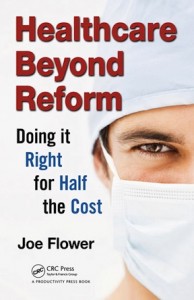[Press Release] Sausalito, Calif., June 20, 2012 — With the Supreme Court’s decision on the healthcare reform act expected within the week, both hope and fear are building that the Court will stop healthcare reform in its tracks. But a healthcare futurist argues that the real reforms in healthcare will survive with or without the law.
“The really big changes already happening in healthcare aren’t riding on the legislation. They are driven by economics,” according to Joe Flower, a healthcare industry analyst and futurist who has worked with the World Health Organization, the U.S. Defense Department, and many Fortune 100 corporations. “The big secret inside the industry is: Better healthcare costs less. It has to. Some in the industry have figured this out, and others are just hoping no one will notice.”
According to Flower, “We can expect a very different, and quite a bit smaller industry over the coming years. But this is not really about cutbacks or rationing. The industry is just now realizing that the only way to do healthcare for significantly less money is to do it better, smarter, leaner, to get to people with more help, earlier — especially the five percent of the population who consume half of all the healthcare resources,” he says. “The changes we are seeing are fundamental, they are growing, and there’s really no going back.” Flower is a frequent healthcare speaker and consultant for groups like the American Hospital Association, Blue Cross Blue Shield, and numerous hospitals, health plans, employers and pharmaceutical companies across the industry.
Flower’s new book, Healthcare Beyond Reform: Doing It Right For Half the Cost, tells the stories of aggressive experiments and rapid change in America’s largest industry. “The industry is huge. If it were a country, U.S. healthcare would be the sixth largest economy in the world. And it’s been very stuck,” he says. “With all the political noise, people have assumed that the only way to change healthcare is to pass a reform act in Congress. In fact, we are at a tipping point. Companies, health systems, states, Native American tribes, the VA, business coalitions, even some health plans, have been trying practical new ways of paying for healthcare, new ways of bringing it to people. And some of those experiments have been succeeding — driving down costs while helping people be healthier. These new programs are changing the industry from the inside out.”
Flower, who helps businesses and the healthcare industry prepare for change, estimates that the U.S. could get better healthcare for all Americans for half as much as it pays today. “That’s a conservative estimate. Smarter healthcare is so much cheaper. Do it right, and we could save $1 trillion per year. In fact, that is the only real answer to reducing the federal deficit.”


I’ll be citing this again on my blog. I just reviewed Dr. John Toussaint’s new book. Lot of similar perspectives.
I love your book.
BobbyG